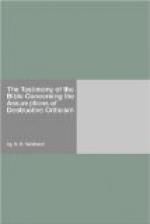The announcing angel said to Mary, “The Holy Spirit shall come upon thee, and the power of the Highest shall overshadow thee: therefore also that holy thing which shall be born of thee shall be called the Son of God.” (Luke i. 35.) The child to be born was to be literally and truly “the seed of the woman,” and that was the Messiah, the only person of the entire human race of whom that could be said.
We are not left, however, to an exegetical statement alone, although that is absolutely unequivocal. The promise was repeated to Abraham, to Isaac, to Jacob, and to David. The seed of the woman was to be the Messiah, the Christ, triumphing over the power of Satan. The race has not triumphed over Satan, but has been a failure.
The Holy Spirit has settled the question in Paul’s Epistle to the Galatians, iii. 16: “Now to Abraham and his seed were the promises made. He saith not, and to seeds, as of many (or, the human race), but as of one, and to thy seed which is Christ.” On the human side, our Savior was of the line of Abraham, and David, but was singularly and literally “the seed of the woman,” being the Son of God.
He called himself the Son of man only in the sense that he was born of her who was of the race of man. He ever claimed God as his Father, and in a different sense from that in which men can claim God as Father. His claim to be the Son of God was the claim to be equal with God, which no created being dare make.
The Holy Spirit further declares, in Hebrews ii. 14; “For as much then as the children are partakers of flesh and blood, he also himself likewise took part of the same, that through death (his death on the cross) he might destroy him (Satan) that had the power of death”—“bruise the serpent’s head.” It was Satan that inflicted death. He was the first higher critic who changed and denied the word of God, saying to the woman, “Ye shall not die.” Through his denial of the word of God, he deceived the woman and brought spiritual death on the race. This was the work of Satan, according to the New Testament teaching. He is the same that God calls the serpent in the third chapter of Genesis. For the Holy Spirit informs us, in 2 Cor. xi. 3, that “the serpent beguiled Eve,” and states definitely who the serpent is—“that old serpent called the devil and Satan, who deceiveth the whole world.” (Rev. xii. 9.)
Having God’s testimony that the serpent and the devil are one and the same, we are prepared for the mark which our Lord puts on him, “A murderer from the beginning ... and no truth in him.” He had always sought to pervert and discredit the word of God. He suggested to Eve that she did not understand God’s command; she had taken it too literally, which is a popular form of attacking the Bible today. “Yea, hath God said ye shall not eat of every tree of the garden?” Are you not mistaken? And when he had injected the doubt into the mind of Eve, had gained an advantage, he seized it and boldly denied the word of God, “Ye shall not die.” He is an artful critic and successfully did his deadly work.




